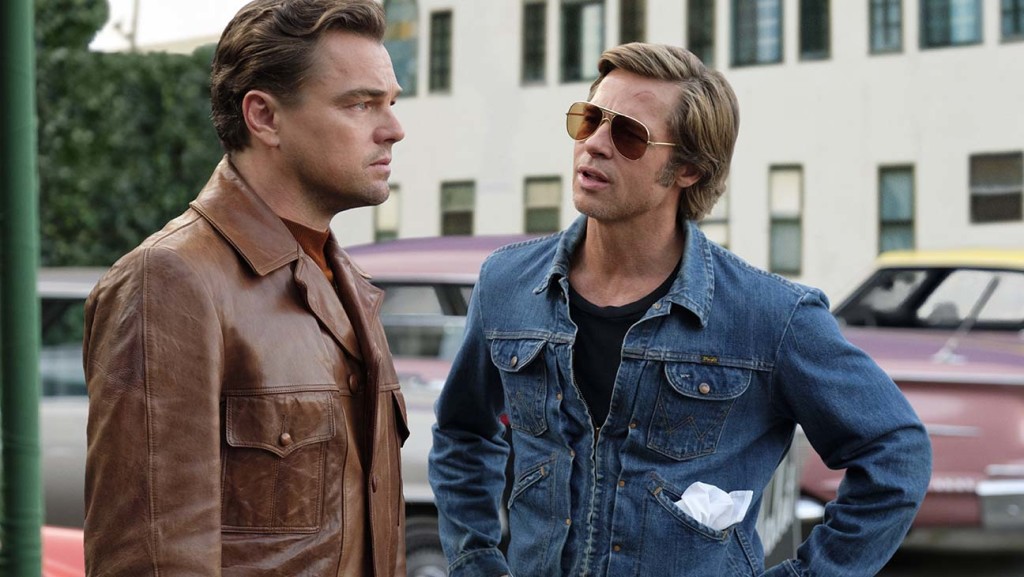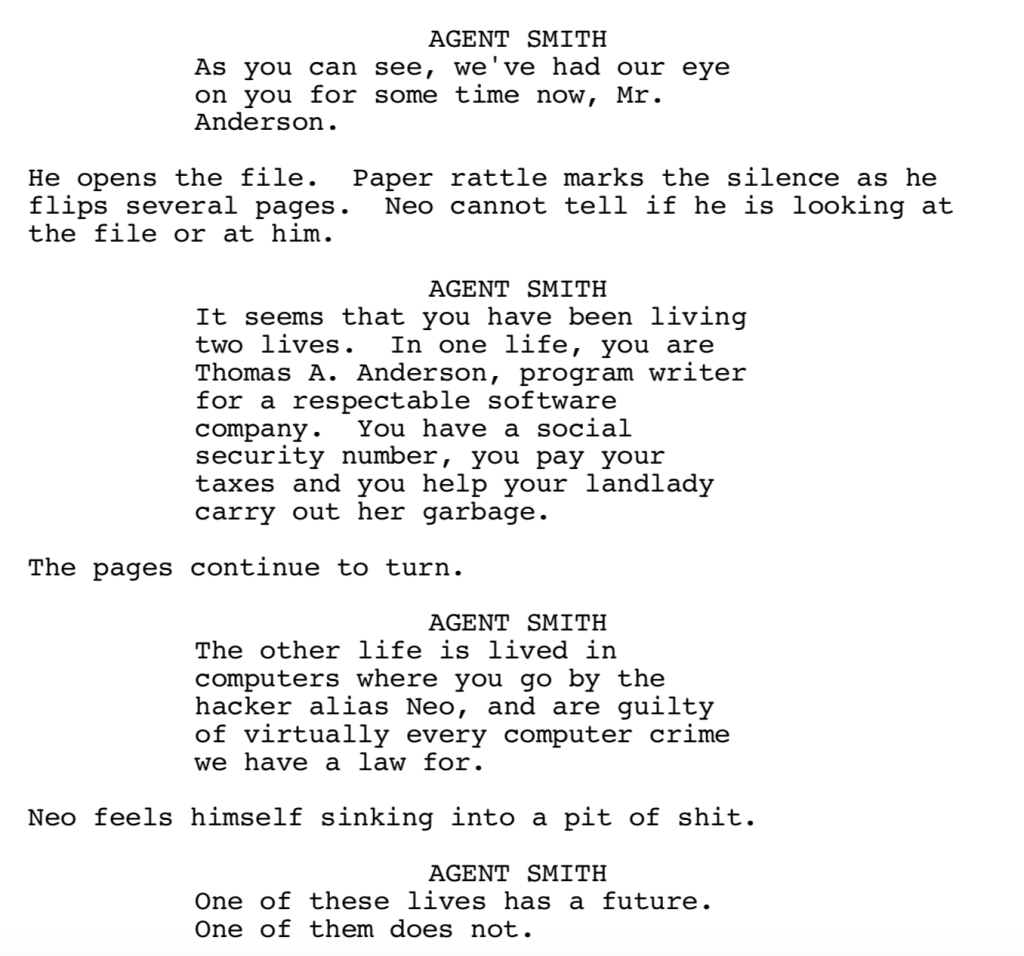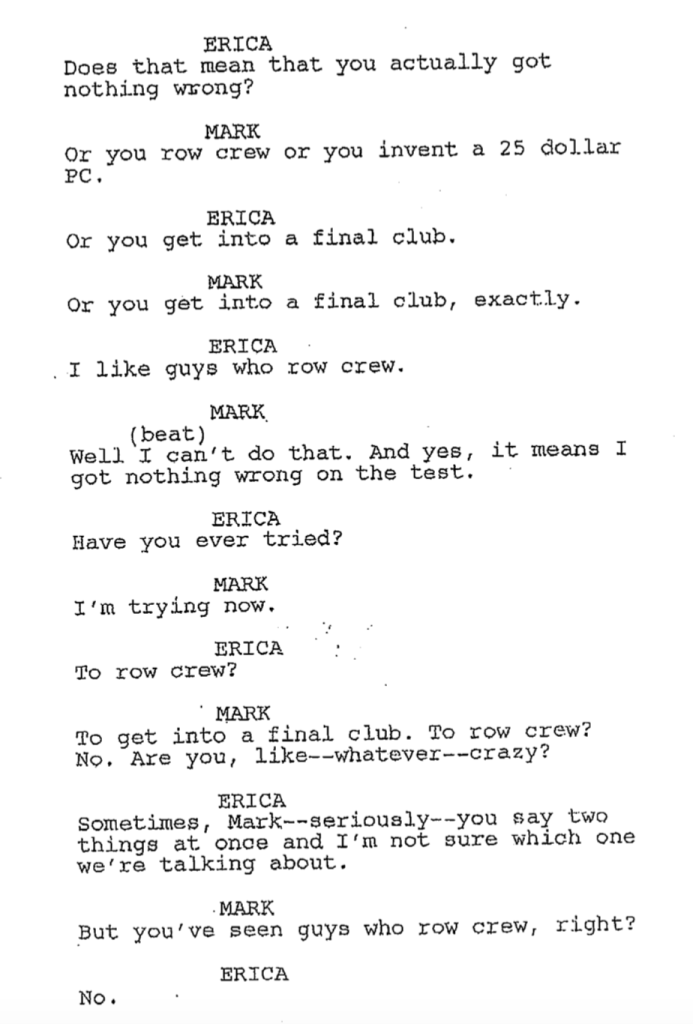The art of dialogue.
Whereas every other component of screenwriting can be taught, dialogue remains a shapeless colorless mist, something we keep trying to grab onto, yet continually come up empty.
How elusive is dialogue? Do a Google search right now. Try to find one article about dialogue that has a tip in it that you haven’t heard 17 million times already.
These people who claim to be dialogue experts can only recite the same tips Syd Field spouted 30 years ago in his best-selling screenwriting book. Come into a scene late. Leave early. Use as little exposition as possible. Blah blah blah. Oh, and here’s my favorite one: Listen to how people talk.
Oh yeah, yeah. I’ll listen to how people talk. Because people talking for 45 minutes is exactly the same as needing to write a two minute conversation in a movie.
Probably the most confusing story about dialogue that I’ve ever come across is the Thor: Ragnarok line. After professional screenwriters making millions of dollars for their months and months of work put Thor: Ragnarok together, they’re shooting the scene where Thor is about to fight someone in a gladiator arena, and out comes the Hulk. Hemsworth says the lines in the script. He then tries a few improv lines. Then there’s a Make-A-Wish kid on set that day. And he says to Chris Hemsworth, “Why don’t you try, ‘I know him. He’s a friend from work.’” Hemsworth does the line, and it not only ends up in the first trailer for the movie, but it becomes the centerpiece of the trailer and its most memorable line.
I want you to think about that for a second. A young kid, somewhere between 8-11 I’m guessing, was able to come up with the most popular line in a movie written and rewritten and developed and re-developed by Hollywood professionals, people supposedly at the very top of their profession.
Messes with your head, right?
Well, here’s what I’ve determined. While there is a randomness to dialogue that contributes to its elusiveness, there is a way to get better at it. There are five areas that influence your dialogue. And that four of them are under your control. The fifth, unfortunately, is not. But, if you can master the other four, you can write good dialogue. So what are these five things?
Know the Basics – Yes, I just made fun of this above. But you do need to learn dialogue basics in order to not make beginner mistakes. Yes, you need to come into scenes late. Yes, you need to leave scenes early. This will ensure that your characters only say what they need to say to move the story forward. Yes, you need to know what on-the-nose dialogue is. You need to understand what exposition is and how to keep it short and sweet. There’s quite a few basic lessons to learn. But a simple google search should have you covered, since they’re the only dialogue rules anyone on the internet knows.
Scene prep and conflict – I talked about this in my first and second dialogue articles in this series. You need to learn how to prep scenes that allow good dialogue to flourish. Understanding how to create a character goal in a scene, how to have the other character be in the way of that goal. Which leads us to conflict. You have to understand how conflict (and tension) works, the many different variations of it, because it is the driving force of most good dialogue. If there isn’t some imbalance in what the two characters want in a scene, their dialogue will be agreeable and mostly boring.
Tricks – Dialogue tricks come from experience. They’re little things you learn along the way that you can pull out whenever you need them to write good dialogue. An example of a trick is instead of having your hero talk about himself, have the other character in the scene do it. It’s almost always more natural. Watch the scene in The Matrix where Agent Smith interrogates Neo. It’s Agent Smith reading off Neo’s life. Neo doesn’t tell him anything. Creating characters that contrast is another. The more your two main characters contrast, the more biting their interactions will be, which will lead to better dialogue. There are tons of tricks to learn. The more you know, the less dialogue situations you’ll encounter that you don’t have answers for. Feel free to leave your dialogue tricks in the comments section.
Characters – Probably the single most important component outside of talent for writing good dialogue is character creation. You need at least some characters in your script who have personality, who like to talk, who have opinions, who are interesting in some capacity. If you insert boring characters who are passive or don’t like to talk or aren’t interesting or don’t have anything to say, the chances of you writing good dialogue are next to zero. Here’s an exercise. Write one scene with The Driver (Ryan Gosling’s character in Drive) and write another with Jack Sparrow. You tell me which scene was easier to write dialogue for. Or it doesn’t have to be as exaggerated as Jack Sparrow. It could be Louis Bloom from Nightcrawler. Or Alonzo from Training Day. Or Mark Zuckerberg from The Social Network. When you create an interesting character who likes to talk, he/she will do most of the work for you. If you don’t, you’re going to be pulling your hair out trying to come up with interesting things to say for that character.
Pure Talent – Aaron Sorkin, Diablo Cody, Woody Allen, Quentin Tarantino, David Mamet. I’m sorry to tell you this, but you will never be these people. They possess a unique talent that allows them to think of things and say things in a certain way that makes their dialogue leap off the page. It’s incredibly frustrating to read a script from one of these people because you know you’ll never be that good. However, there ARE some things you can to do to momentarily upload yourself into the Dialogue Matrix, the place where these kings and queens exist. And if you can get here for even 15 seconds every once in awhile, that may be enough to come up with an amazing line, or a great exchange. To start, you need to realize that dialogue is the most artistic part of screenwriting. Therefore, you must turn off your conscious mind and access your unconscious mind. That means no thinking. That means no judgement. And it means a lot of free-writing. These geniuses write their dialogue mostly on instinct so if you’re not doing the same, you don’t have a shot. Go nuts. Have your characters say whatever comes to mind. You’re more likely to come up with a killer line this way than trying to logic-it into existence. The other thing I get from these writers is that there’s more of a sense of discovery in them. They enjoy trying to find the moment and the characters through their dialogue. Likewise, there’s a playfulness when they write dialogue. Like a kid playing with toys. They’re having fun and seeing what happens. In addition to this, they have a thirst for knowledge and history. They want to know more about the world and how it works. This allows their characters to be smarter and have more ideas to draw from. And they work from a place of, “I’ll edit it down later.” They don’t try to nail it in one go. Sometimes they will. But mostly they’ll write what comes to mind and cut it down to fit in the story later. And this is what allows them to have so many great dialogue moments. With all that exploration, they have more meat to work with.
Dialogue is difficult. But this idea that you’re either good at it or not is false. If you can master the first four areas – ESPECIALLY THE FOURTH – you can definitely get good at writing dialogue. From there, keep working on five. Do what you can. You’ll never surpass the masters. But if you can get to their level every once in awhile? That’s enough.




